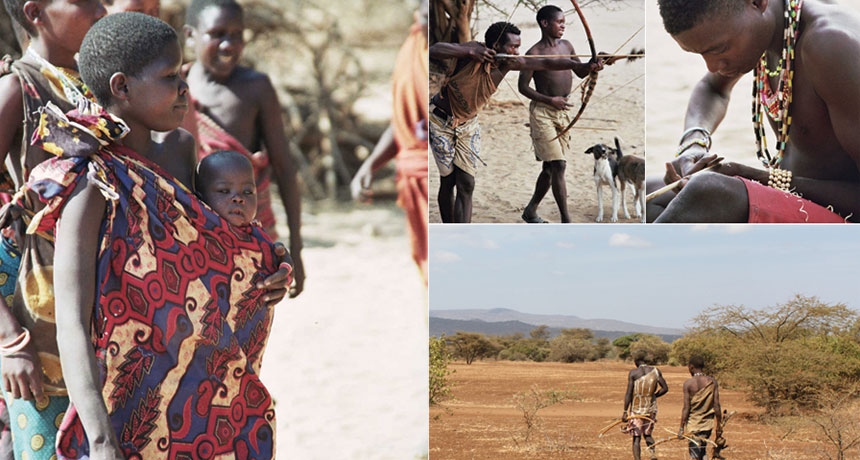-
Tips for becoming a good boxer - November 6, 2020
-
7 expert tips for making your hens night a memorable one - November 6, 2020
-
5 reasons to host your Christmas party on a cruise boat - November 6, 2020
-
What to do when you’re charged with a crime - November 6, 2020
-
Should you get one or multiple dogs? Here’s all you need to know - November 3, 2020
-
A Guide: How to Build Your Very Own Magic Mirror - February 14, 2019
-
Our Top Inspirational Baseball Stars - November 24, 2018
-
Five Tech Tools That Will Help You Turn Your Blog into a Business - November 24, 2018
-
How to Indulge on Vacation without Expanding Your Waist - November 9, 2018
-
5 Strategies for Businesses to Appeal to Today’s Increasingly Mobile-Crazed Customers - November 9, 2018
Who needs eight hours of sleep? No one, say experts
Researchers from Hunter College, Yale University, UC Santa Barbara and the University of New Mexico clocked sleep patterns among the Hadza, hunter-gatherers who live near the Serengeti National Park, and the Tsimane, hunter-horticulturalists who live along the Andean foothills.
Advertisement
A study of three traditional societies in different parts of the world showed that on average they slept a little under 6.5 hours a night.
Though they didn’t have electric lights, none of the groups went to sleep when the sun went down and on average, they stayed up around three hours after sunset.
The prevailing notion in sleep medicine is that humans evolved to go to bed when the sun goes down, and that by and large we stay up much later than we should because we are flooded with artificial light, said Jerome Siegel, the lead author of the new study and a professor of psychiatry at the Semel Institute of Neuroscience and Human Behavior at U.C.L.A.
The San tribe from Namibia, the Hadza of Tanzania and the Tsimane tribe from Bolivia were chosen because their traditional lifestyles lack the technology and trappings of modern life.
There was a “surprising” similarity in sleeping patterns across the three groups of people, which Dr Siegel believes suggests is probably characteristic of how pre-modern ear homo sapiens slept.
Yet the hunter-gatherers included in the new study, which was published in Current Biology, were relatively fit and healthy despite regularly sleeping amounts that are near the low end of those in industrialized societies. On average, they stayed up a little over three hours after the sun went down and woke up before sunrise. One was that hunter-gatherers exhibited a bigger seasonal variation in the amount of sleep they took than “modern” folk do.
“There is this concern in the Western world that we need more sleep and that if you get less than seven hours you’re liable to suffer from obesity and diabetes and heart disease”, he said. “This has important implications for the idea that we need to take sleeping pills because sleep has been reduced from its “natural level” by the widespread use of electricity, TV, the Internet, and so on”.
What do they know how much our ancestors slept?
The researchers monitored 94 people among these groups by handing out wrist devices that track physical activity but also light levels. That’s because most sleep studies take place under controlled environments in the laboratory and often fail to involve more than one group or population.
That daily cycle of changing temperatures change, largely removed from sleep environments in industrialized society, may be a potent natural regulator of sleep, the researchers suggest.
“Many of us may be suffering from the disruption of this ancient pattern”, Siegel said.
And rather than light being the catalyst for sleep, it appears ambient temperature plays a key role.
The findings are striking because health authorities have long suggested that poor sleep is rampant in America, and that getting a minimum of seven hours on a consistent basis is a necessity for good health. By contrast, these hunter-gatherers go to sleep a few hours after sunset, when the night gets chilly.
“When the temperature reaches its minimum and stops falling they wake up – and that is usually near sunrise”.
“Mimicking aspects of the natural environment experienced by these groups might be effective in treating certain modern sleep disorders, particularly insomnia, a disorder affecting more than 20 percent of the US population”, Siegel said. “I see patients who are single parents and have three jobs, and they’ll be lucky to have five hours of sleep and are exhausted all the time”. In comparison, 10 to 30 percent of people in industrial societies report chronic insomnia, the scientists noted.
Advertisement
“In natural conditions, humans sleep [more] during a period of declining temperature”, Siegel said. This might owe to the naturally cool temperatures the hunter-gatherers encounter at night, as our bodies must cool down before we can sleep.





























